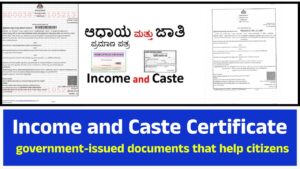Karnataka : Income and Caste Certificate
1. Introduction
In India, two essential government-issued documents that help citizens access various welfare schemes are the Income Certificate and Caste Certificate. These documents act as proof for availing:
- Scholarships
- Reservation in education and jobs
- Government subsidies
- Housing benefits and more

They are vital for students, job seekers, economically weaker sections, and backward communities.
2. What is an Income Certificate?
An Income Certificate certifies a person’s or family’s income per year. It is required to:
- Apply for EWS reservation
- Claim subsidies (LPG, education, housing, etc.)
- Get fee concessions or financial aid
- Avail government schemes based on income
Usually issued by the Tehsildar or local revenue officer, and valid for 1 year.
3. What is a Caste Certificate?
A Caste Certificate proves a person’s caste (SC, ST, OBC, etc.) and is required for:
- Caste-based reservation in jobs and education
- Scholarships for backward classes
- Welfare schemes for SC/ST/OBC groups
- Election eligibility for reserved seats
It is usually valid for a lifetime, unless revoked.
4. Why Are These Certificates Important?
Both certificates are essential to:
- Prove eligibility for benefits under affirmative action programs
- Access economic support for the underprivileged
- Qualify for subsidized or reserved seats in public schemes, schools, and jobs
They help ensure social justice and economic inclusion.
5. Issuing Authorities
| Certificate Type | Issued By |
|---|---|
| Income Certificate | Tehsildar or Revenue Officer |
| Caste Certificate | SDM / District Magistrate / Tahsildar |
6. Eligibility Criteria
Income Certificate:
- Indian citizen
- State resident
- Belong to a low-income group as defined by the scheme
Caste Certificate:
- Must belong to an SC/ST/OBC/EWS community as listed by the government
- State residency and ancestry proof required
7. Benefits
Income Certificate:
- EWS quota (for general category poor)
- Ration, LPG, free education
- Housing and health schemes
- Scholarships for low-income students
Caste Certificate:
- Reservation in colleges and jobs
- Reserved government schemes
- Fee waivers and skill development opportunities
8. Documents Required
Common to Both:
- Aadhaar Card
- Address proof (ration card, electricity bill)
- Photograph
- Affidavit/self-declaration
- Application form
Income Certificate:
- Salary slip / income tax return / bank statement
- Land records (for farmers)
Caste Certificate:
- Caste of parents
- Birth certificate
- School records mentioning caste
9. Online Application Process
- Visit state’s online portal (like Seva Sindhu, eDistrict, etc.)
- Register with mobile number
- Fill out the application form
- Upload documents
- Submit and pay fee (if applicable)
- Receive reference number for tracking
10. Offline Application Process
- Visit Tehsildar’s office or CSC (Common Service Center)
- Collect the form
- Fill and attach required documents
- Submit to the officer
- Collect acknowledgment slip
- Wait for certificate issuance
11. Verification Process
Two-step verification:
- Document Check: By clerk or official
- Field Visit (optional): By revenue inspector for validation
Time taken: Usually 7 to 15 working days.
12. Downloading the Certificate
- Login to the application portal
- Use reference number to check status
- If approved, click “Download Certificate”
- Take a printout for submission
13. Check Application Status Online
- Visit portal’s “Track Application” section
- Enter application/reference number
- View live status (Pending/Approved/Rejected)
14. Caste Categories in India
| Category | Description |
|---|---|
| SC | Scheduled Caste – most backward caste |
| ST | Scheduled Tribe – indigenous communities |
| OBC | Other Backward Class – moderately disadvantaged |
| EWS | Economically Weaker Section – general caste but low income |
15. Income Slabs and Eligibility
| Income Range | Category | Applicable Schemes |
|---|---|---|
| Below ₹2.5 lakh | SC/ST/OBC | Reservation, scholarships |
| ₹2.5L–₹8 lakh | OBC (non-creamy) | Reservation and benefits |
| Below ₹8 lakh | EWS | EWS 10% reservation |
| ₹8 lakh and above | General category | No reservation or subsidy |
16. State-Wise Portals
| State | Portal Name |
|---|---|
| Karnataka | Seva Sindhu |
| Maharashtra | Aaple Sarkar |
| Delhi | eDistrict Delhi |
| Tamil Nadu | TNeGA |
| Telangana | Meeseva |
| Andhra Pradesh | AP Meeseva |
| Kerala | eDistrict Kerala |
| UP | eSathi |
| Bihar | RTPS Bihar |
| Gujarat | Digital Gujarat |
17. Common Errors & Fixes
| Error | Solution |
|---|---|
| Name mismatch | Update Aadhaar or submit affidavit |
| Wrong income declared | Submit new ITR / salary slips |
| Missing caste proof | Submit father/mother caste certificate |
| Rejected application | Reapply with correct documents |
18. Frequently Asked Questions (FAQs)
- Q: What’s the validity?
- Income Certificate: 1 year
- Caste Certificate: Lifetime
- Q: Can I hold both EWS and OBC certificates?
- No. You must choose one.
- Q: What’s the fee?
- ₹10 to ₹50 depending on the state (CSC may charge extra)
- Q: Can I apply without Aadhaar?
- Some states allow alternatives like Voter ID or Ration Card.
19. Latest Government Updates
- Online applications now mandatory in many states
- Digital linking with DigiLocker initiated
- Some states allow self-declaration instead of affidavits
- Push for centralized digital family ID (e.g., Haryana’s Parivar Pehchan Patra)
20. Conclusion
The Income Certificate and Caste Certificate are crucial legal documents that empower citizens—especially those from backward or economically weaker communities—to avail benefits provided under the Indian Constitution and various government schemes.
Proper understanding, timely application, and regular renewal (for income certificate) are essential. With increasing digitization, applying online is fast, secure, and reliable.
Final Note:
Ensure your certificates are valid and genuine. False claims may lead to disqualification or legal action. Apply only if you genuinely meet the criteria.
